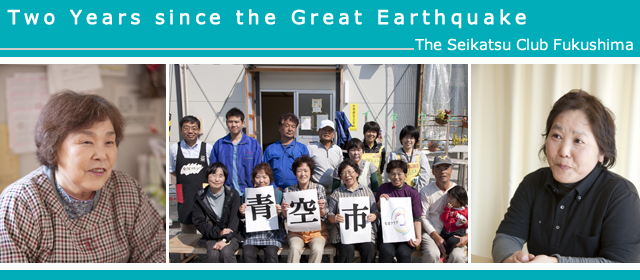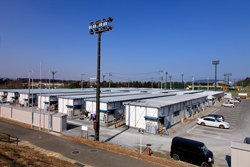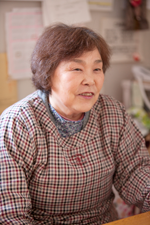To the places where support is needed

The Seikatsu Club Group has been supporting people who were affected by the Great East Japan Earthquake and the nuclear disaster at Fukushima Daiichi Nuclear Power Plant. Two donation campaigns form a part of such support. In the area where the Seikatsu Club Fukushima works, many of the members who lived along the Pacific coastline lost their homes due to the tsunami, and are still forced to live in temporary shelters. In addition, they are concerned about radioactivity. Ms. Toshiko Meguro and Ms. Miyoshi Yokoyama sent video messages to mark the second anniversary of the earthquake. (Posted on March 25, 2013)
Triple difficulties hit Fukushima
 Sharing a border with southern Miyagi Prefecture, Shinchi Town in Fukushima Prefecture has temporary houses in its athletic park, where many survivors of the earthquake still live. The inconvenience of an unsettled lifestyle has been further aggravated by radiation from the Fukushima Daiichi Nuclear Power Plant.
Sharing a border with southern Miyagi Prefecture, Shinchi Town in Fukushima Prefecture has temporary houses in its athletic park, where many survivors of the earthquake still live. The inconvenience of an unsettled lifestyle has been further aggravated by radiation from the Fukushima Daiichi Nuclear Power Plant.
"The area adjacent to our temporary shelters has a higher air dose than any other place in our community. They are now doing decontamination work there," said Ms. Toshiko Meguro early last February. The contaminated area is about ten meters from her temporary shelter. There is a low hill where children used to play. Now the area is surrounded by rope to prevent people from entering, and decontamination work is going on.
The huge earthquake, tsunami and the radiation problems--these triple difficulties hit not only people in Shinchi Town but also everyone in Fukushima. In particular, people's concern over radiation has cast a subtle shadow on families.
Ms. Miyoshi Yokoyama was looking forward to living with her grandsons as she was preparing to rebuild her house in Shinchi Town. However, her dream was shattered. Right after the earthquake, her son, who lives near Tokyo, said to her, "I will come back to my hometown to look after the family." But last September he told her, "I can't come back because I am worried about my kids."
"My son says he would be relieved if my husband and I could go to his place to live with them, but my husband says he wants to continue to live in Shinchi. It was hard to decide, but we chose to remain here," Ms. Yokoyama says.

"I want to take home helper training."
Ms. Yokoyama works mainly as a cook at a daycare center for senior citizens. She is doing this as a temporary job until she leaves her shelter, but she works full time.
"I love cooking, anyway," she says. In the near future, she is planning to get a chef’s license and take the training course to become a home helper, which will be organized at their temporary shelters.
The course is scheduled to be held from this coming June by the Coexistence Community Creation Foundation, whose member organizations include the Seikatsu Club. The idea of the training course came from the Aozora (Blue Sky) Market at the temporary shelters. The market was launched in July 2012 by the Seikatsu Club Fukushima in order to sell its products to the residents. It is now organized by the residents' association and supported by the Seikatsu Club Fukushima. The Seikatsu Club made the suggestion for the training course when it worked on this market and other issues with Shinchi Town Social Welfare Council.
When the Social Welfare Council interviewed residents of temporary shelters in eight areas of the town, many people answered that they were interested in taking such a course. As the Coexistence Community Creation Foundation and the Seikatsu Club Fukushima describe, the course is planned to be held "in order to support community renovation and senior citizens in places where the former communities have been forced to change." Ms. Yokoyama says, "I hope to take the training course because I want to learn about nursing care and use the knowledge in the community."
The memory of the day still remains.
 Ms. Toshiko Meguro also worked part-time for a local nursing home for senior citizens for six months until the end of last year. But she hesitates to take the course because she fears that "working as a home helper would hurt my back." Another reason why she refrains from participating is the memory of March 11. A little after three in the afternoon on that day, a huge tsunami hit the nursing home where she was working at the time. She herself was hit by the tsunami and was totally unable to help the elderly people. When she worked as a part-time nurse, her heart sometimes beat fast due to flashbacks of the sights she saw during the tsunami.
Ms. Toshiko Meguro also worked part-time for a local nursing home for senior citizens for six months until the end of last year. But she hesitates to take the course because she fears that "working as a home helper would hurt my back." Another reason why she refrains from participating is the memory of March 11. A little after three in the afternoon on that day, a huge tsunami hit the nursing home where she was working at the time. She herself was hit by the tsunami and was totally unable to help the elderly people. When she worked as a part-time nurse, her heart sometimes beat fast due to flashbacks of the sights she saw during the tsunami.
Not only her house but also the beloved dishes she bought from the Seikatsu Club and kept carefully in her house were swept away. "I love Oribe ware (earthen ware made in Oribe) and collect them. I was bitterly disappointed that all of my dishes were swept away. I still place orders, but I don't just keep them. I use them without worrying very much about how they might get broken."
Similarly to Ms. Yokoyama, Ms. Meguro is also planning to rebuild her house. "I may still be living in this temporary shelter up to the end of this year," Ms. Meguro says. She is eagerly waiting for the day when she can move into her new house. On the other hand, Ms. Yokoyama will have to live in the shelter longer, because she needs more time to prepare the land to build her new house on. They talk in unison about the support from the Seikatsu Club and other groups. “I hope to come and visit people who are supporting us. I would also love to support somebody else when they need help in a disaster."
- A video message from Ms. Yokoyama
- A video message from Ms. Meguro
生活クラブをはじめませんか?
42万人が選ぶ安心食材の宅配生協です
ウェブ加入限定 無料プレゼント






